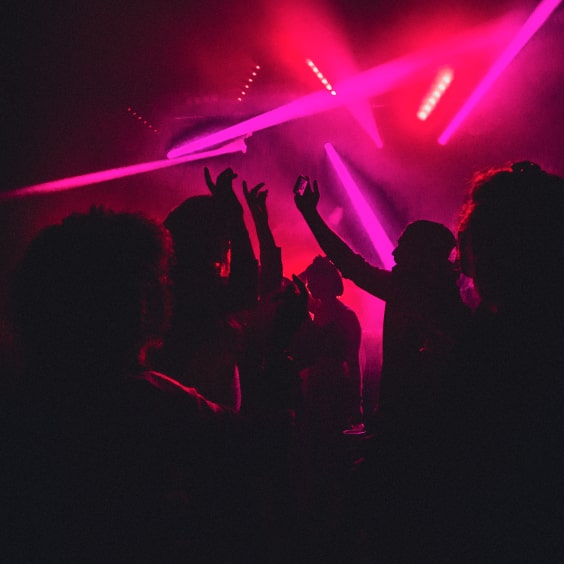Distribution in the discotheque playback categories

Discotheques live from music. From which exactly, we find out.
On a ranking of places that would have no meaning without music, discotheques definitely would rank very high. A club or a discotheque without driving beats or reverberating party sounds is hard to imagine. This is also reflected in the licence fees collected, which are naturally higher than those for a hairdresser, for example. It is important to us that we distribute the collected revenues as fairly as possible to our members. That is why we developed a special monitoring process for discotheques.
This is how discotheque monitoring works
After taking off administrative costs and a deduction for social and cultural purposes, we can pay out the licence fees we receive from discotheque operators to our members. A process known as discotheque monitoring is the basis for our distribution. This is how it works: Monitoring devices are installed to a large, representative number of DJ mixing consoles all over Germany. They record which tracks are played and for how long. Then, these usage reports are projected to the whole of Germany. This allows us to calculate (on average) which works were played how often and for how long in Germany's discotheques during the respective usage period. The result is the respective distribution amount per work.
You can find out more about discotheque monitoring here.


At a glance: Playback in discotheques
This is how the categories are divided up:
In the DK category, we distribute royalties received for the communication to the public of works by DJs in discotheques, clubs etc.
In the DK VR category, we distribute royalties received for the reproduction by DJs for the purpose of the communication to the public in discotheques, clubs etc.
Where the revenues come from:
1. We license mechanical music playbacks in venues with regular dance events according to our tariff M-CD II.
2. We license reproductions of works from the GEMA repertoire that are used in communication to the public according to our tariff VR-Ö. From each of these sources, we receive licensing income.
Distribution type and underlying usage information:
You can find more about distribution in the DK category in our
Good to know
When DJs play music in public (e.g. in clubs or discos), this is considered a “mechanical reproduction.” Organizers usually do not submit setlists to us – therefore, royalties are paid as a flat rate via the DK and DK VR categories, not through the live performance categories.
You only receive royalties from the live categories if:
-
the event has the character of a concert – meaning the music is the main focus, the audience attends specifically for the DJ performance, and the event must be registered with GEMA as a concert
-
the license fees for the event exceed €500
Important for club events: The required €500 threshold is rarely met, so clubs and discos usually operate under flat-rate agreements. You can find more about the GEMA tariff for these uses at gema.de.
This means for you: There are no payouts from the live categories for such events. You do not need to submit setlists or file complaints regarding these performances.
Please remember: Upload your sound files in the GEMA online portal so your tracks can be considered in the discotheque monitoring process.

Important dates and deadlines for you
All works should be registered to GEMA at the latest upon release, preferably using our online
Annual distribution cycle:
There is one distribution each year, as of 1 June.
Claims:
Since a monitoring process is applied here, you are not eligible to send claims for the DK and DK VR categories.